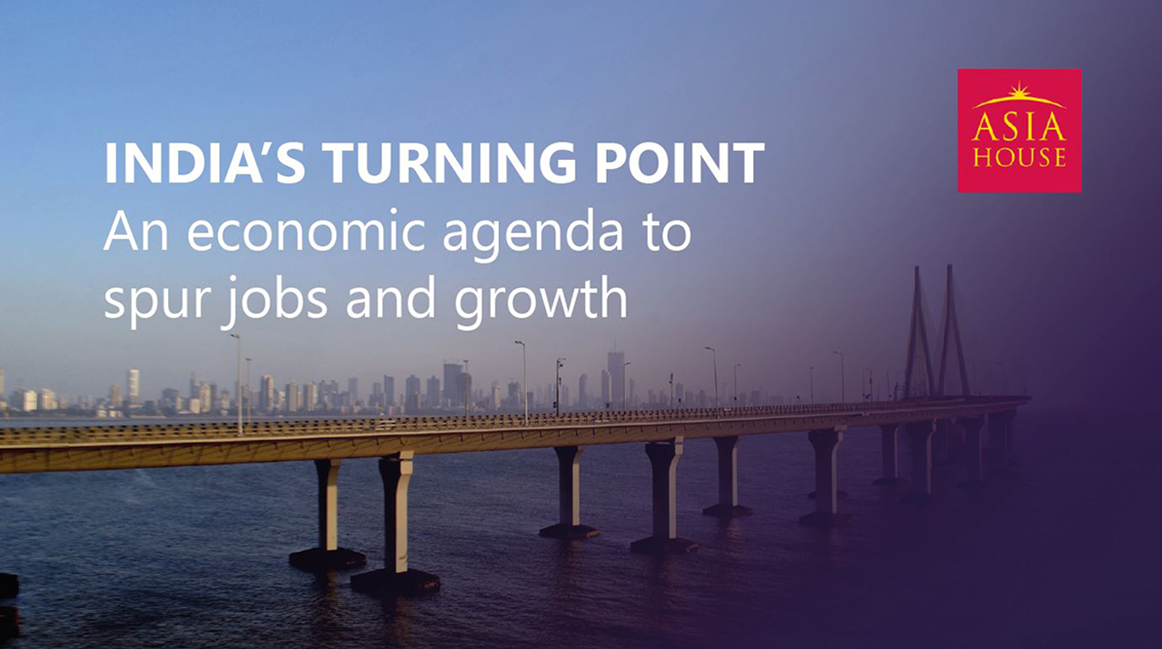Driving commercial and political engagement between Asia, the Middle East and Europe
Driving commercial and political engagement between Asia, the Middle East and Europe
Driving commercial and political engagement between Asia, the Middle East and Europe

Asia House, in partnership with the McKinsey Global Institute, is bringing leading policy and industry figures together to explore India’s economic prospects.
Since mid-August, India has become the country with the second-highest number of coronavirus infections globally. The economy, battered by the strict lockdown, saw a 23.9 per cent year-on-year contraction in GDP from April to June, the biggest slump on record. This has added to the Indian government’s woes; even before the COVID-19 crisis, the Indian economy was set to record its lowest level of growth in a decade. In the wake of the dual public health and economic impacts of the pandemic, the Modi government’s ambition to create a US$5 trillion economy by 2025 appears increasingly distant.
An economic rethink is required to meet the aspirations of India’s growing workforce. A new report by the McKinsey Global Institute (MGI) finds that India is at a turning point: it needs to create at least 90 million non-farm jobs by 2030, which requires boosting GDP growth by 8 to 8.5 per cent every year from 2023 to 2030. This is an ambitious goal, given the slowdown in the year leading up to the COVID-19 pandemic, and the extreme economic uncertainties posed by the crisis itself. However, not taking steps to address the growth imperative now could mean a decade of stagnation, with low income growth and rising unemployment.
According to the report, global trends such as rapid progress in automation and artificial intelligence, shifts in global value chains based in part on changing geopolitics, and growing efforts to tackle climate change are giving rise to business opportunities that could contribute US$2.5 trillion of economic value and support 30 per cent of nonfarm jobs in 2030.
The creation of these opportunities depends on having the right enabling reforms in place to raise productivity and competitiveness, as well as financial system reforms to generate the necessary capital. At the same time, the corporate world will also need to evolve: India must address its “missing middle” of firms and enable many more to climb the ladder of scale and competitiveness. In order to execute this ambitious reform agenda, both central and state governments will have a critical role to play.
In partnership with the McKinsey Global Institute, Asia House is bringing together business leaders and policy experts in this roundtable to discuss the reform agenda and the outlook for India’s economy. Join us to hear more about the business opportunities identified in the report, the themes for economic reforms, and the role for the central and state governments and businesses in capturing opportunities for India in this coming decade.
This online event takes place on 27 October, 09:00 – 10:15 UK time. To register interest in this event, please email Edward Danks, Content Producer: edward.danks@asiahouse.co.uk
SPEAKERS
 Anu Madgavkar
Anu Madgavkar
Partner, McKinsey Global Institute
Anu Madgavkar is a partner at the McKinsey Global Institute (MGI), the global business and economics research arm of McKinsey & Company. Her research focuses on labour markets, inclusive growth, inequality and the impact of technology. Anu leads these themes globally as well as for India, where she is based.
 Amitabh Kant
Amitabh Kant
CEO, NITI Aayog
Amitabh Kant is the CEO of National Institution for Transforming India (NITI). He is also a member of the Indian Administrative Service and the author of ‘Branding India – An Incredible Story’. Kant has been a key driver of the Make in India, Startup India and Incredible India initiatives that positioned India as a leading manufacturing and tourism destination. In his capacity as Secretary (Industries) Govt. of India, Kant drove the Ease of Doing Business initiative and ranking of States on outcome parameters. He is the Chairman of the Committee to implement Digital Payment in India.
 James Crabtree
James Crabtree
Associate Professor of Practice, Lee Kuan Yew School of Public Policy
James Crabtree is a Singapore-based author and journalist, and Associate Professor of Practice at the Lee Kuan Yew School of Public Policy. His best-selling book “The Billionaire Raj” was short-listed for the FT / McKinsey book of the year. His career has spanned both policy and media, including working at the Financial Times, and as an advisor in the UK Prime Minister’s Strategy Unit under Tony Blair and Gordon Brown.
